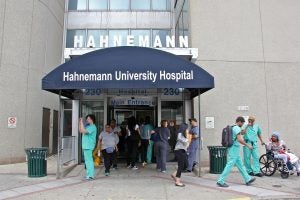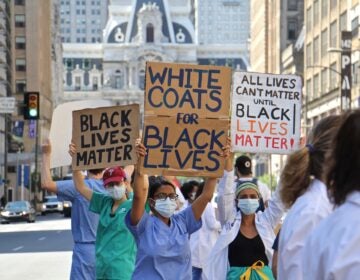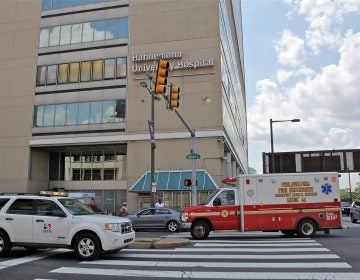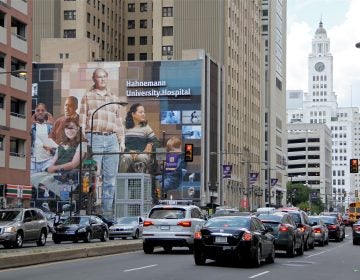A medical resident’s eulogy for Hahnemann Hospital
On the last day for most of the residents, one doctor-in-training bids farewell to the 171-year-old teaching hospital at Broad and Vine Streets.
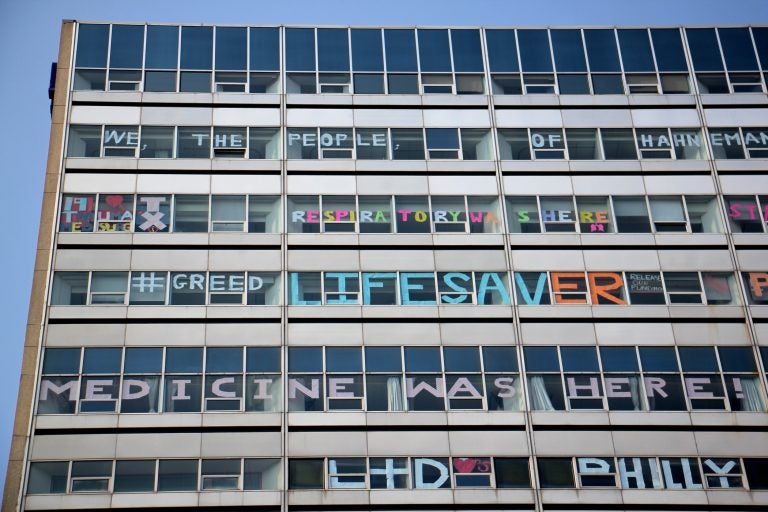
Hahnemann Hospital windows are decorated by employees as the hospital prepares to close. (Emma Lee/WHYY)
I found out Hahnemann University Hospital would be closing just days before the halfway point in my surgical training. The announcement had an immediate impact on patients, employees, trainees, and students. While I will never be able to personally comprehend the effect that the hospital closing will have on the vulnerable population that Hahnemann has served for over 100 years, I can speak to the influence this institution has had on me as an individual and a doctor. My hope is that, by writing this, those whose lives have been shaped by this hospital will know they are not alone.
The first patient I ever examined as a medical student was at Hahnemann. She was a young woman with asthma, who was unable to keep her follow-up appointments or afford the medications that would have kept her out of the emergency room, so she kept coming back. On each visit to the hospital, she was treated with respect and the intention of preventing another admission. I remember the desperation in her voice when she pleaded to be discharged so she could take care of her young children, who had been left home alone. I felt torn: On the one hand, I knew she needed more care, and discharging her would increase the likelihood she would end up back in the emergency room; on the other hand, she needed to return to her kids.
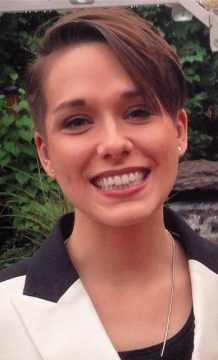
I became more comfortable with these types of situations as they happened more frequently. I was guided by senior residents and attendings on approaching difficult patients, delivering bad news, and understanding how to provide the best care for your patient while bearing in mind the challenges of working within our current model of health care. We took patients knowing the cost of caring for them would be greater than their public insurance would reimburse the hospital. We took patients who were underinsured, undocumented, or medically illiterate, and did everything we could to provide them the best care.
Less than a month into my training as a medical student, I witnessed my first patient death at Hahnemann. It was a 20-year-old man who suffered a gunshot wound. I put my stethoscope against his chest and heard a deafening silence echo back at me. As a student, I was partially shielded from the next steps: calling the family, filling out paperwork, dictating a death summary detailing the events leading up to death. I watched the residents’ faces change as they struggled to accept that even with all of their efforts, they would soon be the voice on the other end of someone’s worst phone call.
Not long after, I was the one making the calls. I remember two young men involved in the same exchange of gunfire — one with a minor wound, and one we were unable to save. I called two different mothers that day — one who sighed with relief, and one who wailed in grief. I’ve called priests to deliver last rites, and listened to families pray on the other side of a curtain while death was pronounced. I’ve watched a young woman lay in bed next to her dying mother, sobbing, while I tried to reassure her that her mother felt no pain.
Hahnemann was a place where doctors and patients formed lasting bonds.
As a resident in the ICU, I once sat down with a family in the waiting room to privately discuss that their loved one had died. I cried with them. I left the lobby, still shaken, and found a woman waiting for me. She told me that I had been the resident who took care of her when she was in the ICU. She said she wanted to thank me and the other residents who cared for her. She could tell from my face that something heartbreaking had just happened. Our roles shifted momentarily as she hugged me and reassured me that this hospital did good work.
I remember one young man who had been assaulted numerous times, and developed a chronic wound that made him unable to care for his child or even go out in public. He spent months in the ICU preparing for surgery, being cared for by rotating members of our team. At first, he was skeptical whenever he would get a new resident assigned to him. But over time, many of the residents became close to him. He told us about the circumstances leading to his assaults. He cracked jokes and made us laugh while we changed his dressings. He knew us all by name and would ask for us specifically. After his surgery, he came in for his follow-up appointment and told us about going to the beach with his family, and taking walks around the neighborhood with his child — all things he had he had never been able to do before.
Unlike many hospitals, almost all of the direct patient care at Hahnemann was provided by residents. That means we answered every page for traumas and responded first for patient emergencies. We are a diverse group that cared for the most vulnerable individuals in Philadelphia. Although we always had the mentorship of our attending physicians, we were the first ones to the bedside when there was a problem. We ate, slept, worked together as team for 24-hour stretches, and by the end of our shifts, we were family.

Now, as I walk through the halls of an empty hospital with no patients left, the loss is physically tangible. Formative moments in my training took place in rooms that are now occupied by piles of hospital telephones, computers, IV poles, and code carts. Memories of both tragic human suffering and miraculous recoveries are being replaced by visions of empty supply closets and deserted patient rooms.
I mourn the loss of this hospital as I would a lifelong friend. Rest in power, Hahnemann University Hospital.
—
Lynsey Daniels was a third-year surgical resident at Hahnemann University Hospital and will continue medical training at Cooper University Hospital in Camden, New Jersey.
WHYY is your source for fact-based, in-depth journalism and information. As a nonprofit organization, we rely on financial support from readers like you. Please give today.


